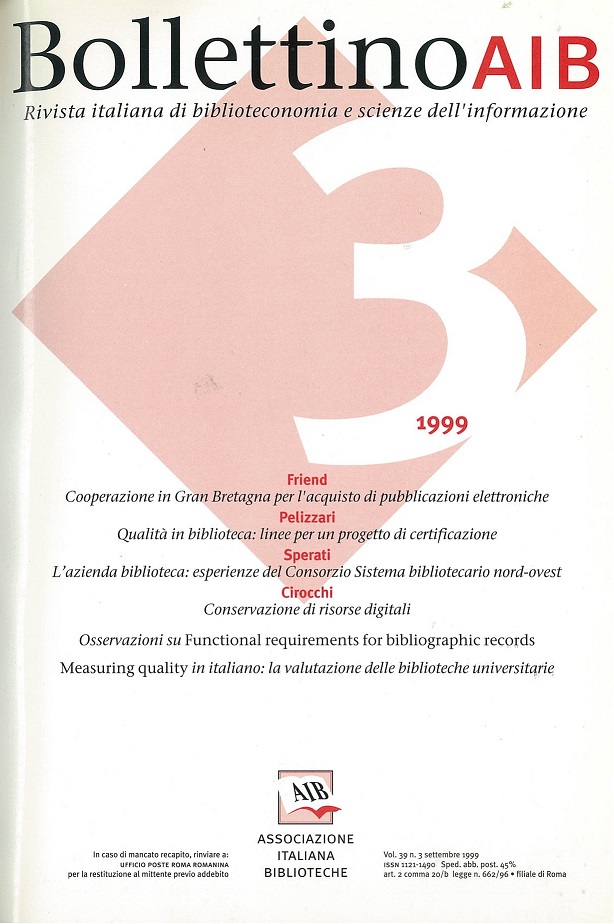The library as a company: or, how the Consorzio Sistema bibliotecario nord-ovest seeks to "balance its books" while maintaining the quality of its services
Main Article Content
Abstract
What is the difference between a library and a company? This question has given rise to a heated debate, with numerous points of view.
However, it is indisputable that while the former moves within the ambit of culture and the limbo of the public body, the latter is subject to the laws of the market. If we then add the legitimate, admirable aspiration of local libraries to continue to promote society's cultural democratisation, these two positions appear irreconcilable. These are the considerations underlying the present project vision of the Consorzio Sistema bibliotecario nord-ovest (North-west Library System Consortium).
The consortium, which is based at Novate Milanese and was established in 1997 on the ashes of the CBS (Library Services Centre, 1983-1986), and Intersistema bibliotecario (Library Intersystem, 1986-1996), is taking its first steps in the increasing turbulent and varied panorama of public libraries and of Italy's public administration. In this climate of great legislative, technical and scientific innovation, the member administrations chose to create not a services consortium, but rather a special company with economic, entrepreneurial importance. Combined with the climate of great change found in public bodies for some years now, this allows the Consortium to take a fresh view of the world of libraries, experimenting innovative solutions which in some cases infuriate the librarian community but whose final objective is the conscious and, as far as feasible, financially autonomous management of the services. There is in fact a consensus that value means freedom, independence and autonomy from third parties in one's own choices.
The concepts the consortium seeks to develop have been "borrowed" from corporate economics and management and re-worked for the reality of the local libraries. How-ever, the intent is not to deny the role and primary function of the public and local libraries, as defined in the Unesco Manifesto and by professional laws and literature, but instead to ascertain if the public local library can now also occupy new, still to be experimented ambits.
The consortium has sought to think differently, to establish the possibility of passing from theory inspired by economic and managerial logics to practical realisation. At times, it was solely an exercise, i.e., of learning to think of the library as a company which is therefore subject to all the laws, often harsh, which determine its survival on the market. Considerable importance has therefore been given to the economic concept of innovation, i.e., to the fact that, even when scarce, resources can be used with techniques and methodologies that multiply their usefulness. The underlying philosophy is that the Consortium no longer belongs to the ambit of the public body, understood as a secure place where it is difficult even to realise that the wrong strategy has been followed, because of the absence of checks: those who make mistakes do not pay for them.
The "exercise" was not an end in itself, because sooner or later, above all in situations of economic crisis, it is perhaps necessary to actually conclude the metamorphosis from public body to private company.
The paper first illustrates the "progress" of the Consortium's activities and continues with a series of hypothetical reasonings and points for further discussion vis-à-vis the various innovative possibilities espied. Some diagrams which describe the Consortium's data, history and institutional set-up are also included to facilitate comprehension.
Article Details

This work is licensed under a Creative Commons Attribution-ShareAlike 4.0 International License.
